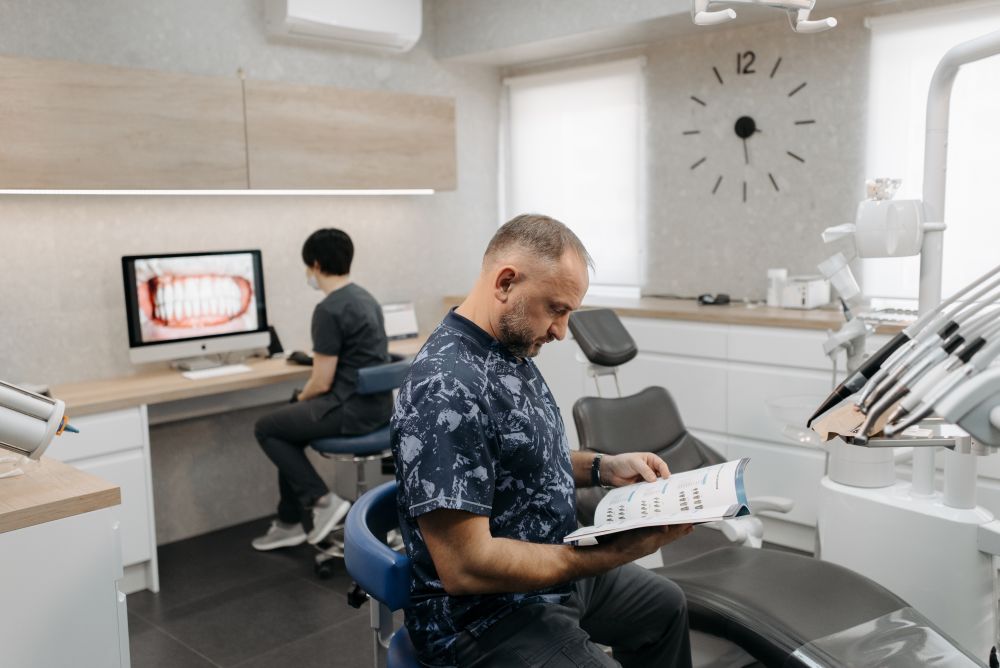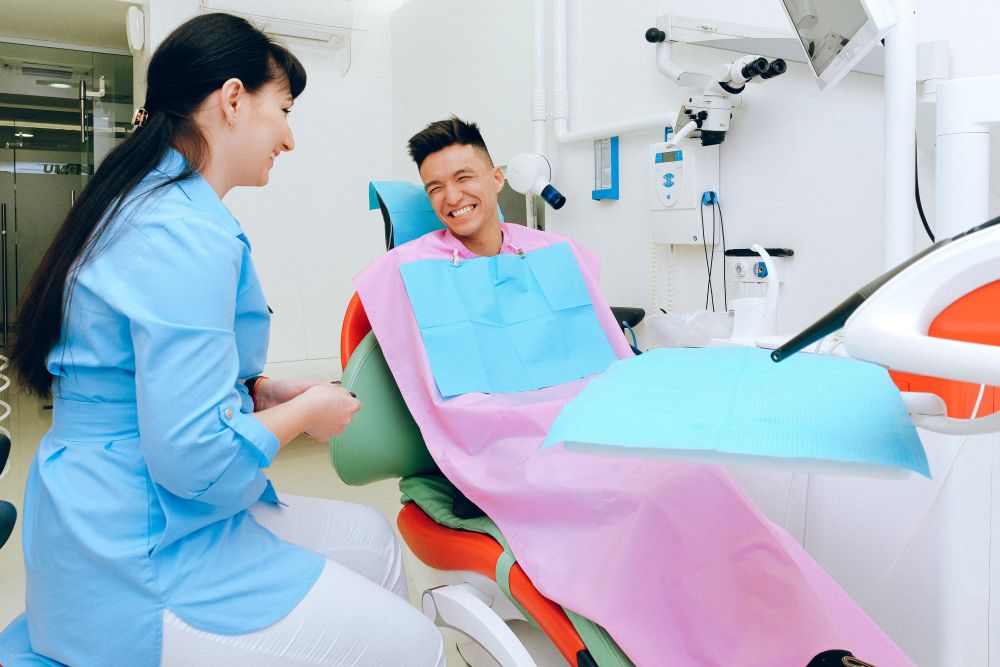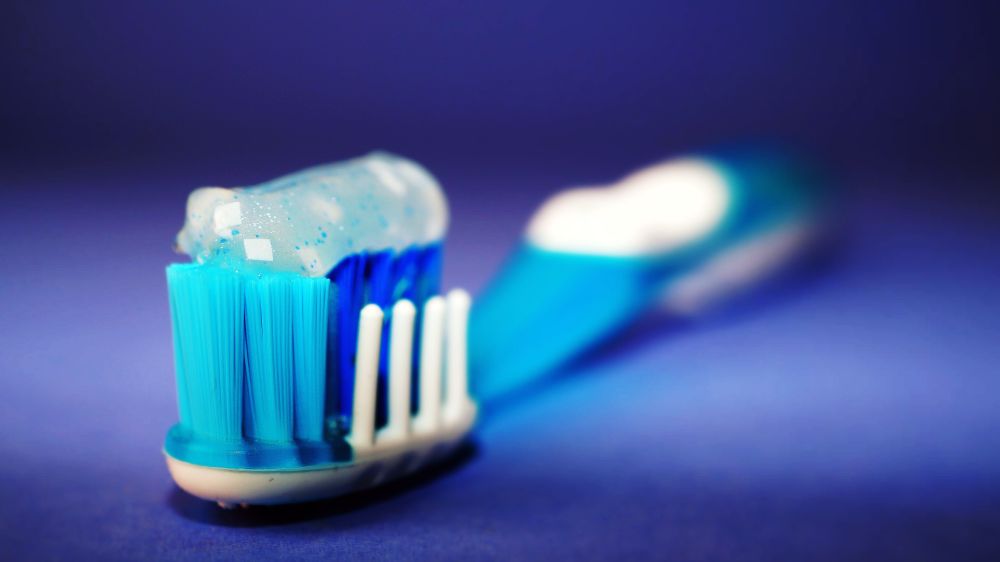Alice’s unnecessary struggle
Today, I want to take a moment and introduce you to Alice. Alice was a lovely lady who used to fill her days as an artist; but lately, her health has kept her from doing all of the things she loves most.
Alice would wake up in the morning, barely able to drag herself out of bed. She was exhausted all day long and couldn’t muster the energy to complete even the most simple tasks.
Her mood was low, and she stopped painting. She couldn’t find the desire to pull out her easel and paint brushes, and she had no inspiration to create her beautiful artwork.
Tags
- healthy eating
- gingivitis
- Impact of Oral Health
- Dental infections
- dental cleaning
- gum disease
- oral cancer screening
- healthy diet
- cardiovascular disease
- Proper oral care
- oral systemic connection
- oral disease prevention
- oral health
- Proper oral hygiene
- flossing
- dentures
- electric toothbrush
- Dental care
- dry mouth
- Overall Health
- teeth brushing
- dental hygiene
- Oral-Systemic Link
- cavities
- healthy food choices
- Mouth and Body Connection
- gum infections
- periodontitis
- Dental Health Tips
- vascular disease
- mental health
- Health Warning Signs
- arterial plaque
- tooth infection
- Preventive Dentistry
- coronary heart disease
- dental disease
- Systemic Health
- dental health
- dental exam
- Oral Hygiene
Connecting the Dots: Your mouth and your body
For many people, it isn’t easy to think of our body as one connected machine. It is easier to think of ourselves as separate working parts that make up a whole. This is how we have been taught as young children, and it is how the medical community deals with health issues. If you go to your doctor with a specific health concern, the symptoms are treated, and you are sent on your way. Very seldom do doctors utilize a whole-health approach and look at the entire body to find connections between illness and the symptoms being experienced. Unfortunately, this is causing people all over the world to suffer needlessly.
Tags
- healthy eating
- gingivitis
- Impact of Oral Health
- Dental infections
- dental cleaning
- gum disease
- oral cancer screening
- healthy diet
- cardiovascular disease
- Proper oral care
- oral systemic connection
- oral disease prevention
- oral health
- Proper oral hygiene
- flossing
- dentures
- electric toothbrush
- Dental care
- dry mouth
- Overall Health
- teeth brushing
- dental hygiene
- Oral-Systemic Link
- cavities
- healthy food choices
- Mouth and Body Connection
- gum infections
- periodontitis
- Dental Health Tips
- vascular disease
- mental health
- Health Warning Signs
- arterial plaque
- tooth infection
- Preventive Dentistry
- coronary heart disease
- dental disease
- Systemic Health
- dental health
- dental exam
- Oral Hygiene
Where do cavities come from?
Do you know where cavities come from?
If you are like most Americans, you have probably spent your entire life believing a lie.
Most people firmly believe a diet high in sugary foods and not brushing your teeth will be the main culprit in causing cavities. Unfortunately, this isn’t entirely accurate.
Tags
- healthy eating
- gingivitis
- Impact of Oral Health
- Dental infections
- dental cleaning
- gum disease
- oral cancer screening
- healthy diet
- cardiovascular disease
- Proper oral care
- oral systemic connection
- oral disease prevention
- oral health
- Proper oral hygiene
- flossing
- dentures
- electric toothbrush
- Dental care
- dry mouth
- Overall Health
- teeth brushing
- dental hygiene
- Oral-Systemic Link
- cavities
- healthy food choices
- Mouth and Body Connection
- gum infections
- periodontitis
- Dental Health Tips
- vascular disease
- mental health
- Health Warning Signs
- arterial plaque
- tooth infection
- Preventive Dentistry
- coronary heart disease
- dental disease
- Systemic Health
- dental health
- dental exam
- Oral Hygiene
To Floss or Not to Floss: Why Flossing in Oral Hygiene Matters
When it comes to taking care of our mouths, we’ve been taught wrong all along. Since childhood, we have been told to brush our teeth twice a day for as long as it takes to sing the “Happy Birthday” song twice — roughly two minutes. This just isn’t long enough, and as we get older, most of us spend even less time than this. We squirt some toothpaste onto our brushes, give them a swish around our mouths, and rush out the door. And spending so little time on brushing, it goes without saying that most of us don’t even bother to floss.
Tags
- healthy eating
- gingivitis
- Impact of Oral Health
- Dental infections
- dental cleaning
- gum disease
- oral cancer screening
- healthy diet
- cardiovascular disease
- Proper oral care
- oral systemic connection
- oral disease prevention
- oral health
- Proper oral hygiene
- flossing
- dentures
- electric toothbrush
- Dental care
- dry mouth
- Overall Health
- teeth brushing
- dental hygiene
- Oral-Systemic Link
- cavities
- healthy food choices
- Mouth and Body Connection
- gum infections
- periodontitis
- Dental Health Tips
- vascular disease
- mental health
- Health Warning Signs
- arterial plaque
- tooth infection
- Preventive Dentistry
- coronary heart disease
- dental disease
- Systemic Health
- dental health
- dental exam
- Oral Hygiene
3 Ways to Improve Your Oral Care Routine
Taking good care of your teeth and gums not only gives you a nice smile, it prevents other health complications such as gum disease. Gum disease, or periodontitis, is linked to serious health problems including heart disease, diabetes, low birth weight in infants, stroke and Alzheimer’s disease. The good news is that you can save yourself money and a trip to the doctor by making these three changes to your at-home oral care routine:
Tags
- healthy eating
- gingivitis
- Impact of Oral Health
- Dental infections
- dental cleaning
- gum disease
- oral cancer screening
- healthy diet
- cardiovascular disease
- Proper oral care
- oral systemic connection
- oral disease prevention
- oral health
- Proper oral hygiene
- flossing
- dentures
- electric toothbrush
- Dental care
- dry mouth
- Overall Health
- teeth brushing
- dental hygiene
- Oral-Systemic Link
- cavities
- healthy food choices
- Mouth and Body Connection
- gum infections
- periodontitis
- Dental Health Tips
- vascular disease
- mental health
- Health Warning Signs
- arterial plaque
- tooth infection
- Preventive Dentistry
- coronary heart disease
- dental disease
- Systemic Health
- dental health
- dental exam
- Oral Hygiene
What’s Your Physician’s Position on Oral Health?
A yearly checkup at your physician’s office usually consists of a complete body exam. They test your reflexes, monitor your pulse and blood pressure, run blood tests, and even take a urine sample. Along with all of these tests, they’ll ask you a whole host of questions about your diet, lifestyle, and mental health. During these physical exams, it seems like your doctor thoroughly examines your entire body, but how often do they look into your mouth and ask about your oral health?
Tags
- healthy eating
- gingivitis
- Impact of Oral Health
- Dental infections
- dental cleaning
- gum disease
- oral cancer screening
- healthy diet
- cardiovascular disease
- Proper oral care
- oral systemic connection
- oral disease prevention
- oral health
- Proper oral hygiene
- flossing
- dentures
- electric toothbrush
- Dental care
- dry mouth
- Overall Health
- teeth brushing
- dental hygiene
- Oral-Systemic Link
- cavities
- healthy food choices
- Mouth and Body Connection
- gum infections
- periodontitis
- Dental Health Tips
- vascular disease
- mental health
- Health Warning Signs
- arterial plaque
- tooth infection
- Preventive Dentistry
- coronary heart disease
- dental disease
- Systemic Health
- dental health
- dental exam
- Oral Hygiene
Do You Really Need a Healthy Mouth to Have a Healthy Body?
One thing that people often forget is that every part of your body is connected to another part. That means that the health of one area directly affects the health of another. The same is true for the health of your mouth. When you have infections in your teeth and gums, they can quickly spread to other areas of your body, leading to new infections and other health complications.
Tags
- healthy eating
- gingivitis
- Impact of Oral Health
- Dental infections
- dental cleaning
- gum disease
- oral cancer screening
- healthy diet
- cardiovascular disease
- Proper oral care
- oral systemic connection
- oral disease prevention
- oral health
- Proper oral hygiene
- flossing
- dentures
- electric toothbrush
- Dental care
- dry mouth
- Overall Health
- teeth brushing
- dental hygiene
- Oral-Systemic Link
- cavities
- healthy food choices
- Mouth and Body Connection
- gum infections
- periodontitis
- Dental Health Tips
- vascular disease
- mental health
- Health Warning Signs
- arterial plaque
- tooth infection
- Preventive Dentistry
- coronary heart disease
- dental disease
- Systemic Health
- dental health
- dental exam
- Oral Hygiene
The Dental Medical Convergence Mission: Bridging the Dental – Medical Divide
Most people don’t know the surprising connection between the health of the mouth and the health of the body. Mounting research points to a correlation between poor oral health and diseases including cardiovascular disease, diabetic complications, and dementia.
If these health problems could be prevented through proper oral care, then why aren’t more doctors and dentists talking about this important topic? That’s what Dr. Charles Reinertsen has been wondering for years. It’s why he founded The Dental Medical Convergence in 2021.
Tags
- healthy eating
- gingivitis
- Impact of Oral Health
- Dental infections
- dental cleaning
- gum disease
- oral cancer screening
- healthy diet
- cardiovascular disease
- Proper oral care
- oral systemic connection
- oral disease prevention
- oral health
- Proper oral hygiene
- flossing
- dentures
- electric toothbrush
- Dental care
- dry mouth
- Overall Health
- teeth brushing
- dental hygiene
- Oral-Systemic Link
- cavities
- healthy food choices
- Mouth and Body Connection
- gum infections
- periodontitis
- Dental Health Tips
- vascular disease
- mental health
- Health Warning Signs
- arterial plaque
- tooth infection
- Preventive Dentistry
- coronary heart disease
- dental disease
- Systemic Health
- dental health
- dental exam
- Oral Hygiene
The Guide You Need to Improve Your Oral Health
You may not know this, but the health of your mouth can impact the health of your body. Your mouth is full of bacteria, and if you don’t properly care for your teeth, the bad bacteria can enter your bloodstream and spread to other parts of your body. That’s why we created a guide with five questions you should ask your dentist. These questions can lead to eye-opening oral health information that could be connected to other health issues in your body.
Tags
- healthy eating
- gingivitis
- Impact of Oral Health
- Dental infections
- dental cleaning
- gum disease
- oral cancer screening
- healthy diet
- cardiovascular disease
- Proper oral care
- oral systemic connection
- oral disease prevention
- oral health
- Proper oral hygiene
- flossing
- dentures
- electric toothbrush
- Dental care
- dry mouth
- Overall Health
- teeth brushing
- dental hygiene
- Oral-Systemic Link
- cavities
- healthy food choices
- Mouth and Body Connection
- gum infections
- periodontitis
- Dental Health Tips
- vascular disease
- mental health
- Health Warning Signs
- arterial plaque
- tooth infection
- Preventive Dentistry
- coronary heart disease
- dental disease
- Systemic Health
- dental health
- dental exam
- Oral Hygiene
Connecting the Mouth and Heart in February: Understanding the Link Between Oral and Heart Health
Heart disease is the No. 1 killer of Americans. That’s why the entire month of February is devoted to raising awareness for cardiovascular health. Preventing heart disease can start with caring for your mouth.
Most Americans don’t realize oral health may play a part in heart health. Research shows that people with gum disease have two to three times the risk of having a heart attack, stroke, or other serious cardiovascular issue. The Dental Medical Convergence began with the intent of educating people on the role oral health plays in the rest of the body’s health, including cardiovascular health.
Tags
- healthy eating
- gingivitis
- Impact of Oral Health
- Dental infections
- dental cleaning
- gum disease
- oral cancer screening
- healthy diet
- cardiovascular disease
- Proper oral care
- oral systemic connection
- oral disease prevention
- oral health
- Proper oral hygiene
- flossing
- dentures
- electric toothbrush
- Dental care
- dry mouth
- Overall Health
- teeth brushing
- dental hygiene
- Oral-Systemic Link
- cavities
- healthy food choices
- Mouth and Body Connection
- gum infections
- periodontitis
- Dental Health Tips
- vascular disease
- mental health
- Health Warning Signs
- arterial plaque
- tooth infection
- Preventive Dentistry
- coronary heart disease
- dental disease
- Systemic Health
- dental health
- dental exam
- Oral Hygiene
How Gum Disease Affects Overall Health: Understanding the Mouth-Body Connection
Preventing heart disease can be as simple as cleaning your teeth every day. More and more research illustrates that periodontitis, also known as gum disease, is linked to many other health problems. That’s why The Dental Medical Convergence is raising awareness about the importance of oral health.
Tags
- healthy eating
- gingivitis
- Impact of Oral Health
- Dental infections
- dental cleaning
- gum disease
- oral cancer screening
- healthy diet
- cardiovascular disease
- Proper oral care
- oral systemic connection
- oral disease prevention
- oral health
- Proper oral hygiene
- flossing
- dentures
- electric toothbrush
- Dental care
- dry mouth
- Overall Health
- teeth brushing
- dental hygiene
- Oral-Systemic Link
- cavities
- healthy food choices
- Mouth and Body Connection
- gum infections
- periodontitis
- Dental Health Tips
- vascular disease
- mental health
- Health Warning Signs
- arterial plaque
- tooth infection
- Preventive Dentistry
- coronary heart disease
- dental disease
- Systemic Health
- dental health
- dental exam
- Oral Hygiene
10 Questions You Should Ask Your Dentist: Empowering Your Oral Health Journey
Your mouth holds the key to your overall health. That’s why it’s so important to make the right dental choices. Here’s a list of questions you should ask at your next dental visit:
Tags
- healthy eating
- gingivitis
- Impact of Oral Health
- Dental infections
- dental cleaning
- gum disease
- oral cancer screening
- healthy diet
- cardiovascular disease
- Proper oral care
- oral systemic connection
- oral disease prevention
- oral health
- Proper oral hygiene
- flossing
- dentures
- electric toothbrush
- Dental care
- dry mouth
- Overall Health
- teeth brushing
- dental hygiene
- Oral-Systemic Link
- cavities
- healthy food choices
- Mouth and Body Connection
- gum infections
- periodontitis
- Dental Health Tips
- vascular disease
- mental health
- Health Warning Signs
- arterial plaque
- tooth infection
- Preventive Dentistry
- coronary heart disease
- dental disease
- Systemic Health
- dental health
- dental exam
- Oral Hygiene
Unlock Managing Early Gum Disease: Protect Your Health Before It Worsens
You may not have any pain or notice any symptoms but still be in the early stages of gum disease, also known as Periodontitis. This kind of disease starts with bacteria in your mouth and could lead to tooth loss and much worse: Heart attacks, strokes and diabetic complications. The good news is that once your dentist tells you about the gum disease, you have an opportunity to make some oral hygiene improvements before things get worse.
Tags
- healthy eating
- gingivitis
- Impact of Oral Health
- Dental infections
- dental cleaning
- gum disease
- oral cancer screening
- healthy diet
- cardiovascular disease
- Proper oral care
- oral systemic connection
- oral disease prevention
- oral health
- Proper oral hygiene
- flossing
- dentures
- electric toothbrush
- Dental care
- dry mouth
- Overall Health
- teeth brushing
- dental hygiene
- Oral-Systemic Link
- cavities
- healthy food choices
- Mouth and Body Connection
- gum infections
- periodontitis
- Dental Health Tips
- vascular disease
- mental health
- Health Warning Signs
- arterial plaque
- tooth infection
- Preventive Dentistry
- coronary heart disease
- dental disease
- Systemic Health
- dental health
- dental exam
- Oral Hygiene
It’s Time We All Took a Minute to Think Again About Gum Disease and Overall Health
Too many Americans wait to feel pain before they seek dental help. When it becomes too uncomfortable to chew their food or the pulsing in their mouth keeps them up at night, it signals that an urgent visit to the dentist is in order. Unfortunately, some of the most severe dental complications don’t present with any pain at all — periodontal disease especially is almost always pain-free. There are usually very few symptoms of this condition; however, it can have severe effects on the body.
Tags
- healthy eating
- gingivitis
- Impact of Oral Health
- Dental infections
- dental cleaning
- gum disease
- oral cancer screening
- healthy diet
- cardiovascular disease
- Proper oral care
- oral systemic connection
- oral disease prevention
- oral health
- Proper oral hygiene
- flossing
- dentures
- electric toothbrush
- Dental care
- dry mouth
- Overall Health
- teeth brushing
- dental hygiene
- Oral-Systemic Link
- cavities
- healthy food choices
- Mouth and Body Connection
- gum infections
- periodontitis
- Dental Health Tips
- vascular disease
- mental health
- Health Warning Signs
- arterial plaque
- tooth infection
- Preventive Dentistry
- coronary heart disease
- dental disease
- Systemic Health
- dental health
- dental exam
- Oral Hygiene
Start the new year with a life-saving resolution
Starting a New Year’s resolution can be as simple as putting your own health first — by scheduling your annual physical and a dental exam. Making these appointments every January is a good habit to start now.
Tags
- healthy eating
- gingivitis
- Impact of Oral Health
- Dental infections
- dental cleaning
- gum disease
- oral cancer screening
- healthy diet
- cardiovascular disease
- Proper oral care
- oral systemic connection
- oral disease prevention
- oral health
- Proper oral hygiene
- flossing
- dentures
- electric toothbrush
- Dental care
- dry mouth
- Overall Health
- teeth brushing
- dental hygiene
- Oral-Systemic Link
- cavities
- healthy food choices
- Mouth and Body Connection
- gum infections
- periodontitis
- Dental Health Tips
- vascular disease
- mental health
- Health Warning Signs
- arterial plaque
- tooth infection
- Preventive Dentistry
- coronary heart disease
- dental disease
- Systemic Health
- dental health
- dental exam
- Oral Hygiene















